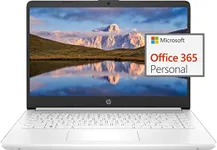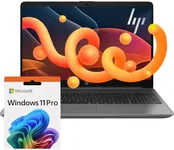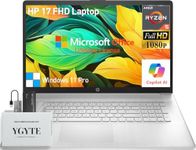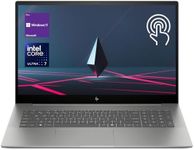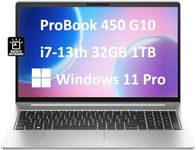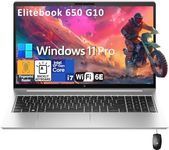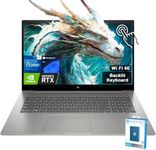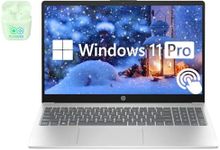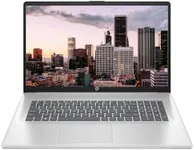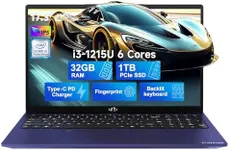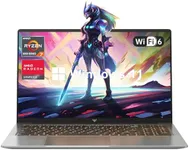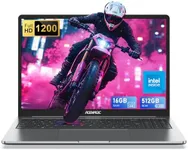Buying Guide for the Best Hp Business Laptops
When choosing an HP business laptop, it's important to consider the specific needs of your work environment and tasks. Business laptops are designed to offer reliability, performance, and security features that are essential for professional use. To make an informed decision, you should evaluate several key specifications that will impact your laptop's performance and usability. Understanding these specs will help you select a laptop that best fits your professional requirements.Processor (CPU)The processor, or CPU, is the brain of your laptop and determines how quickly and efficiently it can perform tasks. For business use, a powerful processor is crucial for multitasking and running demanding applications. Processors are typically divided into entry-level (e.g., Intel Core i3), mid-range (e.g., Intel Core i5), and high-end (e.g., Intel Core i7 or i9). If your work involves basic tasks like word processing and web browsing, an entry-level processor may suffice. For more intensive tasks like data analysis, programming, or running multiple applications simultaneously, a mid-range or high-end processor is recommended.
Memory (RAM)RAM, or Random Access Memory, is where your laptop stores data that is actively being used. More RAM allows your laptop to handle more tasks at once without slowing down. Business laptops typically come with 8GB, 16GB, or 32GB of RAM. For general office tasks, 8GB of RAM is usually sufficient. If you frequently work with large files, run complex software, or need to multitask heavily, 16GB or more is advisable. Choosing the right amount of RAM ensures smooth performance and efficient workflow.
StorageStorage refers to the amount of space available to store your files, applications, and operating system. Business laptops usually offer SSD (Solid State Drive) storage, which is faster and more reliable than traditional HDD (Hard Disk Drive) storage. Common storage capacities range from 256GB to 1TB. If you store a lot of large files or need quick access to data, opt for a larger SSD. For basic use with cloud storage options, a smaller SSD may be sufficient. Adequate storage ensures you have enough space for all your important data and applications.
DisplayThe display size and resolution affect your viewing experience and productivity. Business laptops typically have screen sizes ranging from 13 inches to 15.6 inches. A larger screen can be beneficial for multitasking and detailed work, while a smaller screen offers better portability. Resolution options include Full HD (1920x1080) and higher resolutions like 4K (3840x2160). Higher resolution provides sharper images and more screen real estate, which can be useful for design work or detailed spreadsheets. Choose a display size and resolution that balance your need for portability and screen clarity.
Battery LifeBattery life is crucial for business professionals who need to work on the go without constantly searching for power outlets. Battery life can vary significantly between models, typically ranging from 6 to 12 hours or more. Consider how often you will be away from a power source and choose a laptop with a battery life that matches your work habits. Longer battery life ensures you can stay productive throughout the day without interruptions.
Build Quality and DurabilityBusiness laptops are often subjected to frequent travel and heavy use, so build quality and durability are important factors. Look for laptops with robust construction, such as those made from aluminum or magnesium alloy, and features like spill-resistant keyboards. Some business laptops also meet military-grade durability standards (MIL-STD-810G) for added resilience. Choosing a durable laptop ensures it can withstand the rigors of daily use and last longer.
Security FeaturesSecurity is a top priority for business laptops to protect sensitive data. Look for features such as fingerprint readers, facial recognition, TPM (Trusted Platform Module) chips, and hardware-based encryption. These features help safeguard your data and prevent unauthorized access. If your work involves handling confidential information, prioritize laptops with advanced security features to ensure your data remains protected.
Connectivity OptionsBusiness laptops should offer a variety of connectivity options to ensure compatibility with different devices and networks. Common ports include USB-A, USB-C, HDMI, and Ethernet. Additionally, consider laptops with Wi-Fi 6 and Bluetooth 5.0 for faster and more reliable wireless connections. Having a range of connectivity options ensures you can easily connect to peripherals, external displays, and networks, enhancing your productivity.
Weight and PortabilityThe weight and portability of a laptop are important for professionals who travel frequently or need to carry their laptop between meetings. Lightweight laptops (under 3 pounds) are easier to carry and more convenient for travel. However, lighter laptops may have trade-offs in terms of performance or battery life. Consider your travel habits and choose a laptop that offers a good balance between portability and the features you need for your work.

